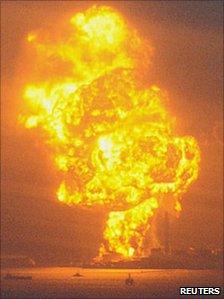Japan earthquake 'terror' of Aberdeen scientist
- Published

The earthquake has caused major fires in many areas of Japan
A University of Aberdeen scientist has told of his terrifying experience in the aftermath of the massive Japanese earthquake.
Dr Alan Jamieson is in Tokyo but escaped injury when the 8.9 magnitude earthquake struck.
Dr Jamieson, who was preparing for a mission at sea, said: "I have to admit I have never been so confused and scared about what to do.
"It became obvious quite quickly that this was no ordinary earthquake."
He said: "We were loading our gear onto three trucks in a large hanger. Suddenly the roller door of the hanger started vibrating.
"My Japanese colleague, Kota Kitazawa, rather confused turned and said to me 'sudden wind?'
"A few seconds later we looked at each other and thought something is wrong here. I looked out of the hanger to my colleague Toyonobu Fujii who was mouthing the word 'earthquake'."
Dr Jamieson went on: "We all ran outside into the car park.
"The electricity pylons started shaking, causing the wires to start whipping. The trucks we were loading started jumping up and down. The ground started to feel extremely fluid. This lasted for several minutes.
"I could tell by the expressions on people's faces that this was not normal. Smaller aftershocks were rumbling beneath us.
"One part of my brain said 'run, run, run' but the other said 'where to? The whole of Japan is moving'.
"We all stood outside the buildings for nearly an hour when a second quake happened.
"The crowd looked up and gasped in fear of sudden collapse. All the trees and lightning rods were flapping with the vibrations and it appeared the entire building was shaking."
He said he and his colleagues stood outside for several hours as people frantically listened to hand-held radios to hear the latest news.
"There were stories of tsunamis, fatalities and magnitudes coming in, varying all the time," he said.
"It seems we were in the midst of an extraordinary event; one of the biggest earthquakes Japan has ever experienced."
He added: "For the rest of the day continuous aftershocks could be easily felt under foot which is extremely unnerving given that we are staying on the 12th floor of a hotel.
"We do not know what is going to happen to our expedition now. We assume that our vessel must have cut ropes and headed for deep water to avoid the tsunami and the dock we use is next to an oil refinery which had exploded.
"My hotel room is constantly creaking and swaying to the continuous aftershocks, although I am told this is nothing to worry about.
"This is not something I ever want to experience again and I hope it ends soon."
Specialised team
Colleagues in Aberdeen said they were relieved to hear the team was safe and well.
Dr Jamieson made the news earlier this month when a new species of shrimp he found several miles below the north west Pacific Ocean was named after him.
Grangemouth-based International Rescue Corps said they were "standing by" to help in the aftermath of the Japanese earthquake.
The IRC has offered a "small but highly specialised team" to the Japanese government, but they have not had a response yet.
The organisation has booked seats on a plane flying on Saturday in case they are asked to send a team.
- Published11 March 2011
- Published3 March 2011